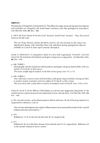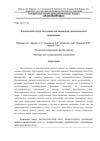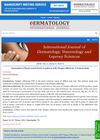 15 citations,
January 2016 in “Przeglad Menopauzalny”
15 citations,
January 2016 in “Przeglad Menopauzalny” Eating a balanced diet with specific nutrients is important for menopausal women to manage hair loss.
3 citations,
December 2019 in “Biomaterials Research/Biomaterials research” Calcium and magnesium in hair increase with age and are higher in adult women.
23 citations,
February 2017 in “Journal of dermatology” Low serum levels of zinc and selenium may increase the risk of alopecia areata.
46 citations,
May 2013 in “The journal of investigative dermatology/Journal of investigative dermatology” Significant progress was made in understanding PXE, but effective treatments are still needed.

Supplements improve health, appearance, and athletic performance.
1 citations,
January 2017 in “Annals of dermatology/Annals of Dermatology” Mineral levels in hair don't significantly affect the severity of atopic dermatitis in children.
 January 1993 in “Journal of International Medical Research”
January 1993 in “Journal of International Medical Research” The document corrects errors in previous articles, including a reversed term, updated subject weights, hair count data, and reference numbering.
 May 2024 in “Journal of trace elements in medicine and biology”
May 2024 in “Journal of trace elements in medicine and biology” Overweight or obese women before pregnancy have lower iron levels in their serum and hair during early pregnancy.
 December 2023 in “Archives of iranian medicine”
December 2023 in “Archives of iranian medicine” Higher iron levels in hair may increase the risk of esophageal cancer.
 February 2024 in “Agroèkoinfo”
February 2024 in “Agroèkoinfo” Environmental factors and grain products affect hair loss, with low cobalt in hair possibly predicting the condition.
 20 citations,
June 2016 in “Magnesium research”
20 citations,
June 2016 in “Magnesium research” Hair follicles help magnesium get through the skin more effectively.
 9 citations,
April 2018 in “Journal of trace elements in medicine and biology”
9 citations,
April 2018 in “Journal of trace elements in medicine and biology” Hair analysis can show nutritional status and environmental exposure, with phosphorus being very stable in hair and differences found based on gender and conditions like depression and autism.
January 2022 in “Indian journal of paediatric dermatology” Children with early graying hair might have lower levels of certain nutrients like zinc, magnesium, and Vitamin B12.
 January 2017 in “Springer eBooks”
January 2017 in “Springer eBooks” Eating a balanced diet with specific nutrients can help manage menopause symptoms and prevent related health issues.
 1 citations,
November 2023 in “Frontiers in veterinary science”
1 citations,
November 2023 in “Frontiers in veterinary science” Goat hair shows changes in metal levels and stress when goats move from indoors to mountain pastures.
13 citations,
June 2011 in “International Journal of Cosmetic Science” Human hair absorbs calcium and magnesium from tap water, affecting its structure and styling properties.
 January 2024 in “Biological trace element research”
January 2024 in “Biological trace element research” Isotretinoin affects trace element levels and requires monitoring of liver and kidney functions.
 63 citations,
May 2017 in “American Journal of Clinical Dermatology”
63 citations,
May 2017 in “American Journal of Clinical Dermatology” People with alopecia areata often have lower levels of vitamin D, zinc, and folate, but more research is needed to understand if supplements can help treat it.
31 citations,
December 2012 in “British Journal of Dermatology” Korean women's hair thins, weakens, and greys with age, with mineral and sterol changes.

Hair can accurately predict iron levels in cattle muscle, helping diagnose mineral imbalances.
 1 citations,
November 2011 in “Dermatologica Sinica”
1 citations,
November 2011 in “Dermatologica Sinica” Women using hair relaxers with alopecia had lower zinc levels, suggesting zinc deficiency might contribute to hair loss.
 June 2022 in “International Journal of Advanced Research in Science, Communication and Technology”
June 2022 in “International Journal of Advanced Research in Science, Communication and Technology” Multivitamin gummies with various vitamins and minerals offer a tasty and easy-to-digest alternative to traditional supplements.
 July 2018 in “International journal of clinical & experimental dermatology”
July 2018 in “International journal of clinical & experimental dermatology” Eat a balanced diet for healthy hair; only use supplements if you have a proven nutrient deficiency.
 2 citations,
August 2022 in “Reproductive Biology and Endocrinology”
2 citations,
August 2022 in “Reproductive Biology and Endocrinology” Magnesium supplements improved quality of life for women with polycystic ovary syndrome, but didn't help with acne, hair loss, or abnormal bleeding.
November 2020 in “IntechOpen eBooks” Not getting enough minerals can lead to health problems and shorter lifespans.
 7 citations,
June 2021 in “Trends in Food Science and Technology”
7 citations,
June 2021 in “Trends in Food Science and Technology” Western diet may cause male pattern baldness; low glycemic diet with magnesium could help.
 48 citations,
February 2008 in “Nutrition in Clinical Practice”
48 citations,
February 2008 in “Nutrition in Clinical Practice” Dietary changes, including weight loss and a balanced diet, are important for managing PCOS, especially in overweight women.
 6 citations,
January 2018 in “PubMed”
6 citations,
January 2018 in “PubMed” Heavy metals might contribute to hair loss in Telogen Effluvium.
 July 2019 in “International journal of dermatology, venereology and leprosy sciences”
July 2019 in “International journal of dermatology, venereology and leprosy sciences” Patients with Telogen effluvium have higher levels of heavy metals than healthy individuals.
 November 2021 in “Permskij medicinskij žurnal”
November 2021 in “Permskij medicinskij žurnal” Women with menstrual dysfunction often have deficiencies in magnesium, iron, and vitamin D.






















